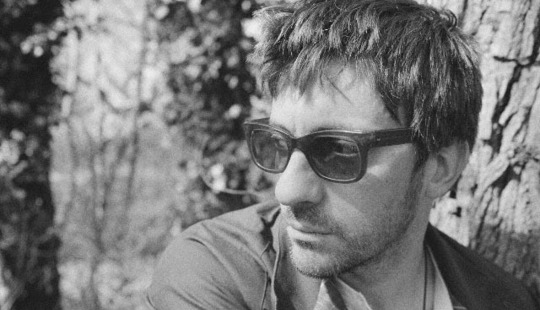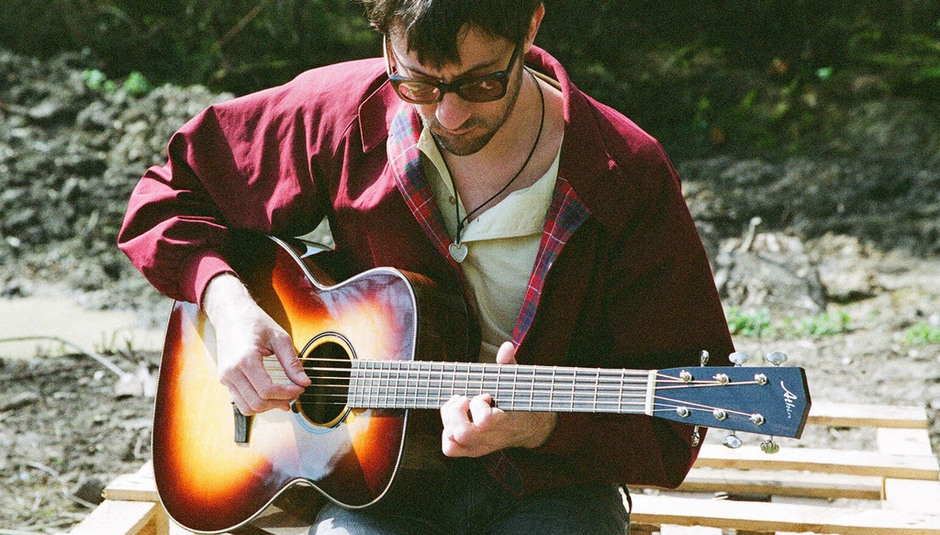Okay, let's get it over with - the very lovely Graham Coxon would probably have quite merrily talked to DiS about Blur (or jellybeans, or elephants, or sunbeans, or anything, really) for the entire length of this interview. His PR sitting in the same room... not so much. So mucho apologies we didn't get too much in about the indie reformation of the summer, but y'know, got a bit and there is still much to discuss, not least a fine new record in the shape of The Spinning Top, a 15-track pastoral song cycle about the life of a man. It's fair to say 'Freaking Out' wouldn't fit on very well.
DiS: So The Spinning Top is a folk record loosely following a life from birth to death; presumably that's the type of stuff you have to pre-plot?
Graham Coxon: They were never things I always wanted to do, they sort of came about by processes, I suppose... I’ve always liked albums that have some sort of thought or philosophy, I suppose more than anything, but I also liked albums where the songs run into each other, so that’s what I wanted to do, I wanted to get the songs into order, I thought to do that it might be easier to put them roughly into a story. In the end I didn’t make any songs join into each other, so it was kind of a waste of time. Well, it wasn’t a waste of time, but it just didn’t really happen that way in the end, for various reasons.
DiS: It's certainly unusually structured; pretty quiet with such loud songs as there are lodged in the middle...
GC: Yeah, I had to stick to that really... obviously we’re used to putting an album together after we’ve recorded it, me and Steven [Stephen Street, long term producer], but I was quite adamant to keep to the order. But I suppose, yes, the sound gets bigger and bigger ‘til it gets quite fat in the middle, then it crawls away into the corner at the end.
DiS: 'In The Morning' would seem to be the album's defining track, in that it's eight and a half minutes long, but doesn't any attempt to be epic or sound anything other than gentle.
GC: Well, I suppose that song is one of the areas that the manure really got to a lot, it really did blossom... if it’s a seasons or a lifespan album then that’s kind of what I wanted the adolescence to be... kind of a freaky time, that sense you’re wired up differently, things change, you’re kind of freaked out by everything, so I wanted it to be about the overwhelmingness of springtime, adolescence.
DiS: It sounds very English, which I guess is a little weird as it uses a lot of Indian instrumentation.
GC: I’ve always wanted to use Punjabi strings and really it was just a good opportunity. I think it is British folk, these days. I didn’t want to just get some white hippy with a sitar just to get a flavour, that makes me kind of cringe a bit. Not the Beatles, but I think generally, and I wanted to use Indian music... because they have a spiritual depth, the voices of the instruments are neither male nor female, they’re strange spirit voices, very natural, and that also doesn’t compromise the scale.
DiS: Why such an abrupt change of tack from your last two records?
GC: I was writing music as I normally do, it’s just that I wrote a lot more, so I had a huge pile made on acoustic guitar, but also a lot of electric stuff, I wrote twice as much stuff and used just the acoustic stuff rather than having just two or three on an album, I didn’t want a mish mash... it’s all very nice having variety, but I feel the last two albums were both a bit unfocused.
DiS: They’re probably your most successful albums.
GC: The green one, probably [Happiness In Magazines]. Which I don’t think is my best. But, um, that’s the public for you.

DiS: Why the three year gap since Love Travels At Illegal Speeds?
GC: I suppose I just wanted to be lazy for a bit, and because I wrote a lot more songs it took longer, and I wanted to concentrate on my relationships a bit more, my daughter was that age, six or seven, beginning to become a bit more aware of all those things that adults are aware of, time, mortality, sentiment and her personality was really growing day by day. And I really had to prepare myself, because I hadn’t really picked much before, so I was practising a lot. And I recorded it a year ago, and had discussions with my record company [Parlophone] over what to do with it and then we went our separate ways quite suddenly, which kind of freaked me out actually.
DiS: Was it because of this record?
GC: I hope so. Nah, I don’t think it was, because a lot of people liked it, I know that, but most of them got sacked or left, they were really excited about the record and still are, because I’m still in contact with them, so yeah...
DiS: Blur are still on Parlophone aren’t they?
GC: They are, yeah. But it’s not like I’m dealing with anyone I know, to be honest there’s only one person left. But you know, whether record companies are evil or not, at Parlophone I found myself quite comfortable with the people I worked with and quite liked over the years, but that doesn’t exist anyway.
DiS: What actually happened to your own label, Transcopic?
GC: It was too much of a drain financially and I didn’t have any time... I’m not that sort, I just haven’t got it, I’m not that way.
Video: Graham Coxon: 'Sorrow's Army' (live)
DiS: Are you at all concerned that this album might be a little overshadowed by Blur?
No, is it? A couple of months before some gigs I suppose... couple of mooooooonths... it’s nearly quarter of the year... no, I think it’s alright. We kind of help each other out. Not that Blur particularly help each other out, but it gives you focus; working with Pete [Doherty] helped, it just means that I’m busy, it doesn’t mean I was overshadowed.
DiS: Yeah, why exactly were you called in to work on the Doherty solo record, Grace/Wastelands?
I think Streety got me in because he was being prepared, because he’d worked with Pete in some past studios and he’d had some good experiences and some not so great ones, and I think he just wanted me to be there for, er, as a sort of steadying influence really, but I don’t think Pete needed it really... he’s in good shape!
DiS: Has your relationship with Stephen Street changed much since early Blur days?
I suppose we’re friends... we’ve always felt like friends and it’s always helped slightly to have a sort of stoic, paternal figure. But now... well I’m quite old now.
DiS: Do you ever butt heads? I can imagine him being the one person who'd tell you if you thought an idea was bad...
GC: No. I respect Steve’s opnions totally, but I'm not easily swayed if I’ve made up my mind about something, and he’s fine with that, he doesn’t bear any grudges necessarily. There were a couple of times when he was like “no!” and got mardy in the studio, but I think most of the time Stephen knows what I’m getting at and respects it.
DiS: Talking of being quite old, an obvious way of looking at this album would be as a middle-aged father dwelling on mortality.
GC: No. Not any more than usual. I think really the story behind it is just a way to disguise the fact that a lot of the album’s just my old obsessions.
DiS: Yeah, you don’t hear it and think ‘oh, this is a bout the life of a guy called Dave’
GC: No, I would hate for that to happen, I don’t want tp dwell on stories too much, even though there may well be one for me or even for other people. To be honest if I was to tell the story it’d be so daft in a way, so mad, that I’d be slightly embarrassed.
DiS: You’ve intrigued me now..
GC: Well, it was just... [massive pause] No, I don’t want to be a tourist guide to it
DiS: The last track on the album, 'November', isn't explicitly about death, but it's very bleak and would correspond to death in the cycle; what was your intent with the song?
GC: Well, there’s two version of that. I was having a very bleak day and watching the rain on the pavement and I wrote that song and that was it
DiS: What about the other version?
GC: The other version? Mmmm [epic pause]. Mmmm [another epic pause]. I don’t know what the other version is, really. I’m sure there is...
DiS: Is the electric metrial a companion record in any way?
GC: No, not really, the other stuff is still all boring old tantrum pop music, but without drumkits, just more primitive equipment. I mean if I were to record that I'd record it really really quickly... or spend a long time over it translate electronic drums into something wild and acoustic, but I’ve not really thought about it.
DiS: Can you just switch the shouty back on? Or think you’ll need to acclimatise after this record?
GC: I don’t know if it’s shouty, it just sounds a bit more, uh, nasty, and not in a kind of post-punk way of my last two albums way, but a bit less guitar, more drum machine and bass influenced, I suppose.
DiS: Have you ever thought of just putting the guitar aside for a bit?
GC: Yeah, I’d love to, it’d be great, but I think a lot of people come to watch me play guitar. But I’d like to leave it all up to somebody else for a few shows, because I can’t sing and play that brilliantly – well, I can’t really sing – but it’d be nice to try and sing and concentrate on it. I think people would rather somebody else sang and I played guitar rather than the other way round.
DiS: How are you going to tour such an expansive record?
GC: Just take a drummer and bass player out for a couple of weeks, maybe expand the group a bit later. I think it’ll be less traumatic to slowly add to a core of three musicians, rather than rehearse 20 people at the some time.
DiS: Is there a lot of Blur work at the moment?
GC: Blur are rehearsing at the moment and it’s all good fun. It seems like it's turned the other way – that my own stuff is the thing I have to fight with and the Blur stuff seems like a laugh.
DiS: Is it a process of relearning lots of old songs at the moment?
GC: I’ve never forgotten any Blur songs, no. It’s weird, it just happens. Obviously there’s a few fiddly bits, but I’ll figure those out. But mostly I’m just the same. Never happy with how the guitar is sounding, but I play it alright, coming in for the backing vocals fine, bit higher than they once felt... mmm... don’t know what that’s about.
DiS: Does it feel weird the level of expectation around it?
GC: I don’t care what they expect, I don’t know, really...
DiS: What do you want out of it?
GC: It’s for the good of us as human beings, or for the fans or whatever, something positive, a chapter in the story.
Video: Damon Albarn and Graham Coxon 'This Is A Low' (live at NME Awards)
DiS: So we can't talk about apparently... moving on - you did a few things to support Record Store Day...
GC: I had a 10-inch out and I played at Pure Groove...
DiS: Do you think it’s a lost cause?
GC: There’s always days for bloody everything. There’s a no smoking day now. Stupid. Um, Record Day. Nah, it’s nice. I was talking to somebody yesterday and they bought a ‘For Tomorrow’ 12-inch and I looked at it and thought ”oh, it’s lovely, this”. Bendy, you know? Bendy.
DiS: You think enough people are getting back into vinyl for it to make a difference long-term?
GC: They’re not though, are they? Downloading, um, irrespective of whether its legal or illegal, and not placing any value on records or people who make records – sooner or later they won’t have the choice of vinyl, CD or downloaded CD booklet or whatever, they’ll just have shitty downloaded files on their computer and that’ll be that and I’ll say “I told you so” and you’ll feel shit about it.
DiS: You don’t think a certain level of residual guilt will stop it all falling apart totally?
GC: I think that residual guilt’s entirely English and maybe American, people in Eastern Europe don’t give a shit. I just depaired when this girl said ”you’re not releasing this in South America so I can download it now illegally” and I said ”that’s not my fucking fault” she said ”well I’m not going to pay extra for import”. That’s bullshit, it is, it took me a long time to save up for Setting Sons by The Jam and I’ve still got it.
DiS: Instant gratification does seem to be the thing these days...
GC: It’s all so disposable now. And with photographs, it’s just take photographs, dump ‘em, take photographs, dump ‘em, whereas before you always had to be careful to take carefully to make sure it was a good ‘un, there was an art to doing it. And it takes three times longer to leave the venue now because everybody wants photos, and a couple of them are crap, so you don’t just sign a little piece of paper, you have to have a little photo session for between four and twenty people. Four people is fine. Thirty people... is a lot. Playing venues with Pete it was like, sixty. That’s a lot of hanging around before you can get your Ginsters on the M11. [nb this is all said in the same gentle, slightly confused tone of voice]
DiS: How is Doherty-mania doing these days?
GC: Oh, it varies. Some nights he’ll go and play an impromptu gig in the alleyway, sometimes he’ll really shut himself away. People really do love him.
DiS: You’re sort of a much-loved figure, yourself... are you happy with the way people view you as 'good old Graham'?
GC: Yeah, I’ll have to change that. I think I should be in a Spiderman movie as the villain. I’m far too dependable, you know. “Good old Graham, he’ll play on the record, it’ll be alright”; ”Good old Graham, he’ll come on the tour, it’ll be alright”. I’m going to start, like, being really nasty.






















